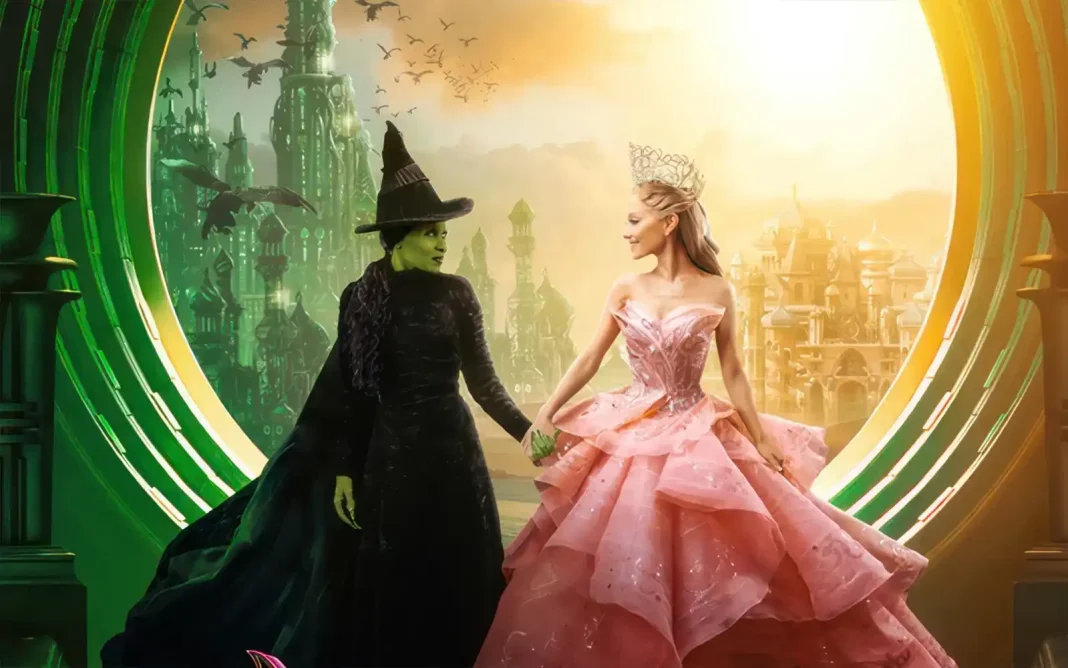As I begin writing, my parents have just walked through the door having finally experienced the cultural phenomenon that is Wicked (2024). My mother is singing something resembling ‘Defying Gravity’. My father, on the other hand, is complaining that the final scene interrupted an otherwise pleasant nap. Whatever your opinion on Wicked, it undeniably defined the tail-end of 2024.
As a fan of the live musical, the film made me wonder: is something always lost when we take the magic of live musical theatre and try to recreate it on-screen? Subverting the conventions of stage musicals in screen adaptations is a comparatively recent phenomenon. Thinking back to old-Hollywood movie musicals, they tend to be more simplistic, recreating the principles of stage musicals rather than moving away from them. Jon M. Chu’s Wicked was visually exciting, but was it doing too much?
Stage musicals are all about illusion; moving furniture in the shadows between scenes and coming up with creative solutions to problems that only occur when directors can’t simply yell ‘Cut!’. Examining the recent history of musicals adapted from stage to screen, productions haven’t always been as solid as Wicked. Dear Evan Hansen (2021), for example, has been a favourite musical of mine for some time. Although the film was enjoyable, the now-nearing-thirty Ben Platt was probably more convincing as a troubled teen when he first appeared as Evan on Broadway.
An audiences’ distance from the stage blurs things that are harder to miss on the big screen. Another infamous example of a movie musical that, in attempting to avoid audience scrutiny, did the exact opposite, was Cats (2019). Poor Dame Judi. Maybe it’s for the best that stage musicals are forced to use animal costumes , rather than trying to make things look ‘real’. CGI can only do so much, but movie musicals seem to increasingly rely on it.
Don’t get me wrong, musicals on stage can also look ridiculous – my family will never recover from Billy Elliot swinging around singing in a slightly affected northern accent – but, arguably, this is part of their charm. Certain reviewers of Wicked were relentlessly critical of the switches between Erivo’s singing and speaking voice. Others found the fixation on perfect CGI overwhelmed the bare bones of the story, which musical fans know and love. The ‘Defying Gravity’ scene took my breath away, but was a far cry from the intimacy and raw emotion that the musical commanded when I first saw it on stage. The difference is that we demand perfection from what we consume on-screen, while in live theatre we forgive a little messiness, and find the experience all the better for it.
However, this is a problem that old-Hollywood musicals seem (mostly) exempt from. As a general rule, they don’t compete with the stage in the same way. It’s not a case of the screen fixing the problems or difficulties of a live stage, but a mixing of both mediums which creates something better than the sum of its parts. I know that I am not the only person who rewatches The Sound of Music (1965) every Christmas. This season it was playing on BBC One and each of my family members made the same comment: it doesn’t matter if you want to watch it or not, you will not change the channel. We were all transfixed. Though the infamously living hills of The Sound of Music look decidedly fake, and the synchronisation of voice and mouth wasn’t quite up to scratch by 1965, it is a wonderful watch.
Other films like Singin’ in the Rain (1952), with its meta film sets, and Mary Poppins (1964), inexplicably featuring animated penguins, have the same captivating quality because they refuse to be seamless. Maybe future film musicals can learn a thing or two by looking back instead of lurching forward and embracing the magical imperfection that characterises the musical.


